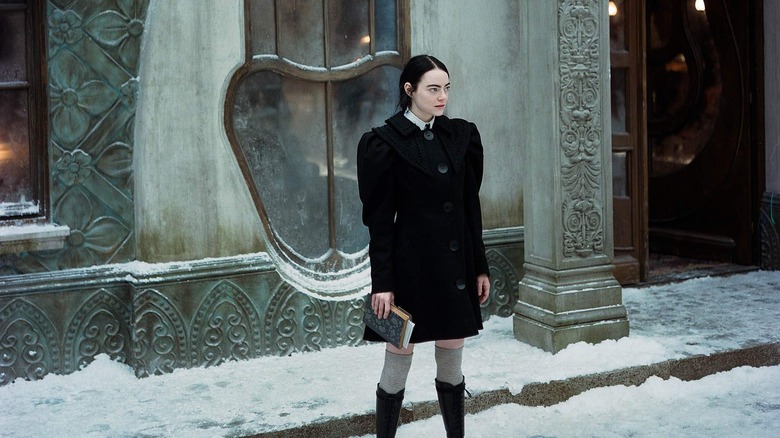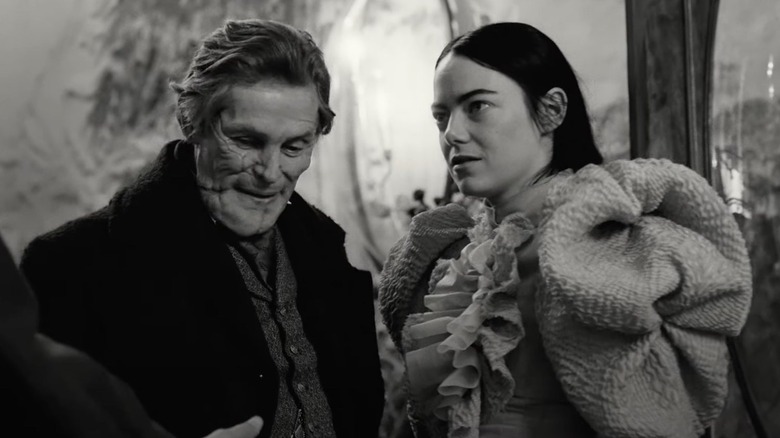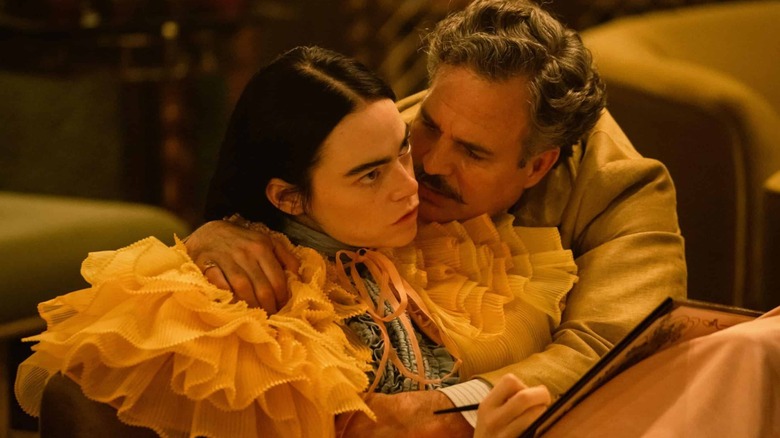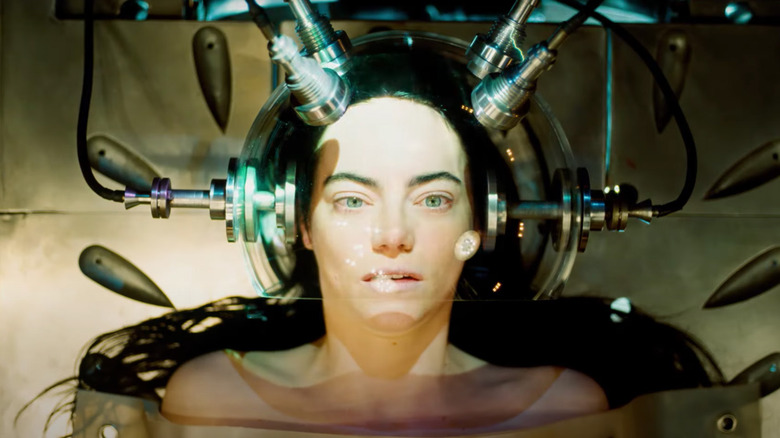Poor Things Ending Explained: The Body Electric
This post will contain spoilers for "Poor Things."
Director Yorgos Lanthimos has made multiple films about characters who are controlled — to mixed fates — by their sexual appetites, and how their sexual desire will ultimately push up against their prison-like boundaries.
In his 2009 film "Dogtooth," a weirdly tyrannical father (Christos Stergioglou) has kept his children confined in their childhood home until their young adulthood, lying to them about the nature of the world and teaching them nonsensical vocabulary. The young son is granted regular conjugal visits from a hired interloper (Anna Kalaitzidou). She, against the father's rules, begins explaining sex to the kids, and they begin thinking about the outside world. The father attempts to control his children's sex lives, but ultimately runs aground on his daughter's taste of knowledge.
In his 2015 sci-fi fantasy film "The Lobster," uncoupled people are forced into depressing romance camps where they must artificially find a romantic partner or face the fate of being magically transformed into an animal. A man and a woman (Colin Farrell and Rachel Weisz) fall deeply in love and work out their honest, but verboten, sexual attraction through a series of codewords and gestures. Eventually, their inability to exercise their sexual energies leads to loss and blindness.
In his 2018 film "The Favourite," Queen Anne (Olivia Colman) is largely clueless about the state of her queendom, and relies on the sexual attention of two warring women (Weisz, Emma Stone) to make her decisions. The two women fall into a sharp rivalry over who gets to be the queen's kept lover.
His new film "Poor Things" is also about sexual appetites, but ultimately reveals lust and sexual freedom as liberating facets of humanity, and the very key for women to shake off the would-be shackles of male-kind.
Candide by way of Frankenstein
"Poor Things" takes place in a fantasy version of Victorian London, wherein a Frankensteinian scientist named Godfrey (Willem Dafoe) has retrieved a woman's pregnant dead body from the Thames. The baby inside of her is still alive, and he removes the infant from its womb and then transplants the baby's brain into the head of the mother. Godfrey christens the new being baby-brained Bella (Stone). The film follows Bella's growing up from a staggering toddler creature of base impulse into a sophisticated adult, discovering, quite innocently, the nature of the world. Possessed of an adult's strength and libido, Bella has to learn to grow up quite quickly.
Bella's picaresque adventures find her betrothed to a kindly medical student named Max (Ramy Youssef), before taking an extended, hedonistic world jaunt in the company of the no-good, ultra-sexual rake Duncan (Mark Ruffalo), who teacher her that life is all about pleasure. She eventually befriends a philosophical old woman (Vicki Pepperdine) and her cynical best friend (Jerrod Carmichael) who teach her that there is poverty and suffering in the world. Out of money, Bella eventually takes a job in a French brothel under the watchful eye of Madame Swiney (Kathryn Hunter) and into the arms of a Socialist lover named Tonette (Suzy Bemba).
Bella will eventually return to Godfrey, a man she calls "God" for short, to finally reveal that she has become an adult and is ready to settle down on her own terms.
Throughout, Bella remains crass and frank, openly no fan of Polite Society. Why keep food in my mouth, she wonders, if it is revolting? Why stop having sex, she wonders, if it is so pleasurable? She is innocent like Candide, often assuming the best about a crass, exploitative world.
The best of all possible worlds
Bella, because of her child brain, is self-obsessed and even destructive for the first quarter of Lanthimos' film. She cares only about her appetites and initially sees others as a means of fulfilling those appetites; she is casually selfish the way a child is.
"Poor Things" essentially posits what might happen if a child is born into a cruel, money-obsessed, unjust world with the body and wherewithal of an adult. Lanthimos, who has previously made acidic, biting, and cynical films, comes to a shockingly optimistic and humane conclusion to this poser. Young women, he says, in controlling their own bodies and their own sexual agency will ultimately find happiness and grow the ability to fight back against the men that oppress them. This is, perhaps, the best of all possible worlds.
The film ends oddly. Just as the story is wrapping up, and it looks like Bella is ready to marry her betrothed and move into her childhood home enjoying a blissful connubial polycule with her husband and her female lover, one final man enters the scene. It seems that Duncan, spitful and immature over his being dumped by a willful Bella, has tracked down the man who was married to Bella before her drowning in the Thames. This is Alfie (Christopher Abbot), and he is a monster. He is rich, collects guns, and cackles when he abuses his hired help. It seems that in her old life, Bella was the abused wife of Alfie, and he fully intends — as he once did — to keep her prisoner in his mansion, impregnate her, and perform a clitorectomy.
Bella, however, unharmed by the rigors of being raised in a misogynist society, sees no reason not to fight back.
Alfie meets a grim/funny fate.
The extra ending
Structurally, the Alfie sequence is a little awkward. Just prior to Alfie's appearance in the movie, everything has wrapped up. Bella has discovered who she is through her sexual liberation, and has learned about the world through books, through friendships, through pain, through experience, and through a staunch refusal to cow to the demands of a cynical world. "Poor Things" is about a woman's natural agency, and how her powers are always going to be stronger than a male-dominated world peppered with oppressive propriety and misogynist leanings.
The Alfie sequence begins after this revelation and perhaps proves to be the final test of Bella's agency. It may also be a way to wrap up a dangling plot thread as to who Bella was when Dr. Godfrey found her. It seems that Bella was once an abuse victim, and was able to, through a scientific fantasy, reinvent herself. Her journey was already clear, so the Alfie sequence was narratively extraneous. Perhaps, in being faced with a literal abuser, and one who aimed to mutilate and keep Bella as a passionless broodmare, Bella was able to find out just how strong she was. Duncan was a cad and a rake, but Alfie was a plan-dealing villain. Can a woman's will stand up to a powerful, gun-toting monster?
Yes. Yes, it can.
Bella escapes Alfie and gets to perform a strange medical experiment of her own on him. The film's final scene is her happily resting in a garden, like Candide, her husband to her right and her girlfriend to her left, resolute in her convictions, eager to study medicine, and perhaps enlightened. The Alfie sequence wasn't wholly necessary, but it did strongly iterate the optimistic themes of "Poor Things."
An optimistic Yorgos Lanthimos? Will wonders never cease?



